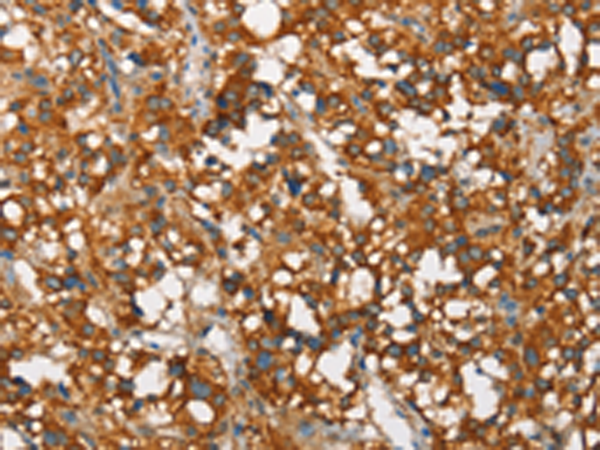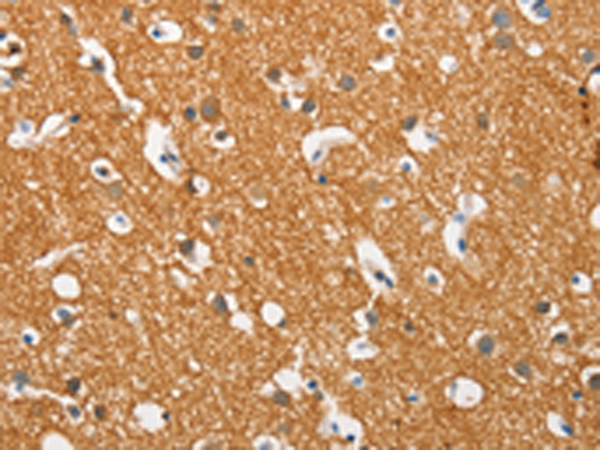

| WB | 咨询技术 | Human,Mouse,Rat |
| IF | 咨询技术 | Human,Mouse,Rat |
| IHC | 1/50-1/200 | Human,Mouse,Rat |
| ICC | 技术咨询 | Human,Mouse,Rat |
| FCM | 咨询技术 | Human,Mouse,Rat |
| Elisa | 1/2000-1/5000 | Human,Mouse,Rat |
| Aliases | PD1; NACP; PARK1; PARK4 |
| Host/Isotype | Rabbit IgG |
| Antibody Type | Primary antibody |
| Storage | Store at 4°C short term. Aliquot and store at -20°C long term. Avoid freeze/thaw cycles. |
| Species Reactivity | Human, Mouse, Rat |
| Immunogen | Synthetic peptide of human SNCA |
| Formulation | Purified antibody in PBS with 0.05% sodium azide and 50% glycerol. |
+ +
以下是3篇关于SNCA(α-synuclein)抗体的代表性文献及其摘要概括:
---
1. **文献名称**:*α-Synuclein in Lewy bodies*
**作者**:Spillantini, M. G., et al.
**摘要**:该研究首次证实α-synuclein(SNCA编码蛋白)是帕金森病路易小体的主要成分,并开发了特异性抗体用于病理检测,为后续研究提供了关键工具。
2. **文献名称**:*Exogenous α-synuclein fibrils induce Lewy body pathology in vivo*
**作者**:Luk, K. C., et al.
**摘要**:通过使用多种SNCA抗体(如抗磷酸化Ser129抗体),研究揭示了外源性α-synuclein纤维在小鼠脑内诱导路易体样病理的机制,验证了抗体的特异性与病理相关性。
3. **文献名称**:*Reducing C-terminal-truncated alpha-synuclein by immunotherapy attenuates neurodegeneration in preclinical models*
**作者**:Games, D., et al.
**摘要**:研究开发了靶向α-synuclein C端截短形式的特异性抗体,证明其可减少转基因小鼠模型的神经退行性病变,提示治疗潜力。
---
这些文献涵盖了SNCA抗体的病理学应用、机制研究和治疗开发方向。如需更多细分领域(如实验技术优化)的文献,可进一步补充。
SNCA antibodies are immunological tools designed to target alpha-synuclein (α-synuclein), a protein encoded by the *SNCA* gene. α-synuclein is predominantly expressed in neurons, where it localizes to presynaptic terminals and plays roles in synaptic vesicle trafficking, neurotransmitter release, and membrane remodeling. It gained prominence due to its pathological association with neurodegenerative disorders termed "synucleinopathies," including Parkinson’s disease (PD), dementia with Lewy bodies (DLB), and multiple system atrophy (MSA). In these conditions, α-synuclein misfolds and aggregates into insoluble fibrils, forming characteristic Lewy bodies or glial cytoplasmic inclusions.
SNCA antibodies are critical for detecting and studying these pathological aggregates in research and diagnostics. They are used in techniques like immunohistochemistry, Western blotting, and ELISA to assess α-synuclein expression, post-translational modifications (e.g., phosphorylation at Ser129), and aggregation states. Specific antibodies can distinguish between monomeric, oligomeric, and fibrillar forms, aiding in mechanistic studies of neurodegeneration.
Therapeutic applications are also emerging, with antibodies explored as potential immunotherapies to target and clear pathogenic α-synuclein species. However, challenges remain, including cross-reactivity with homologous proteins, variability in epitope recognition, and limited penetration of the blood-brain barrier. Despite this, SNCA antibodies remain indispensable for unraveling α-synuclein biology and advancing diagnostics or treatments for synucleinopathies.
×